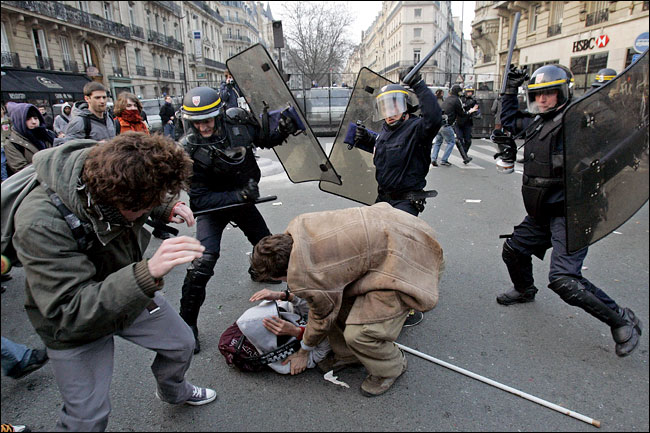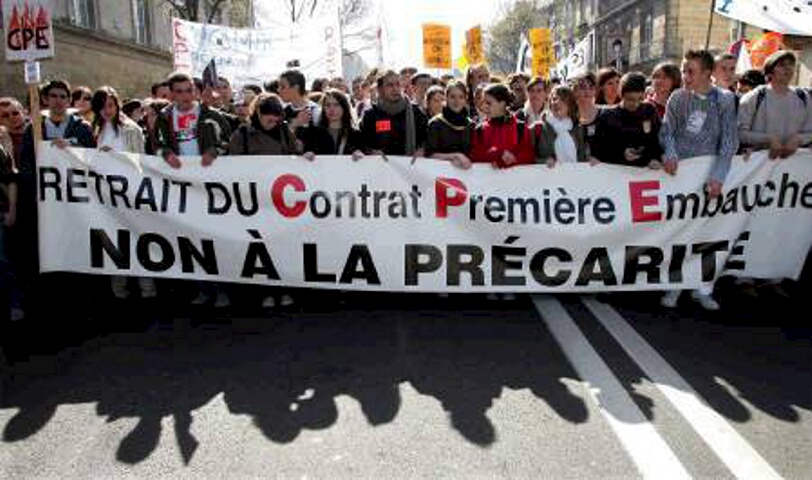Friday, March 17, 2006
France Protests: Against "Slave Labour By The Back Door" posted by Richard Seymour
The French protests are continuing: between 250,000 (police lies) and half a million people (organisers estimate) were out in force yesterday to oppose the law that allows workers aged between 18 and 25 to be sacked in the first two years of employment without a reason. The BBC has said of that law: France tackles youth unemployment. Yes - by making it easier for them to be unemployed. French business leaders are complaining that the laws don't include older workers as well. Union leaders are calling for more protests this weekend, but it seems to me that it would be more apposite to call for a general strike. Some demonstrators barricaded themselves in a town hall, while others have occupied universities: 25 of them on the last count. Over the weekend, the police invaded Sorbonne University and drove out protesters with the use of tear gas. Much of the media have focused on a limited pocket of 'violence', involving about 300 protesters: Paris labour law protest turns violent says The Guardian. Interestingly, the report also says that some far right activists were found to have been attacking the protests. How nice of them to perform such a service for capital and the government. They were not, however, half as proficient as the police.
There are a lot of comforting noises and lullabies being sounded about this: this is not May 1968, we are told, for the protesters are only concerned about their job security, not bringing down the government. Henri Weber, a Socialist Party politician, reassures the New York Times that it's all so very different now: "Sixty-eight was a mass revolutionary movement to create a socialist society", whereas this movement is concerned with a policy only. He said the same thing about the banlieue riots last November. Okay, it's true, this is not a revolutionary movement toward socialism. However, May 1968 started out as a series of student protests against the closure of Nanterre university rather than as an insurrection. It escalated as a result of the police invasion of Sorbonne, and the use of violence and tear gas by police against a number of students who set up barricades. There followed a series of mass strikes, some of them led by grassroots militants, which the union leadership tried to control by channelling them into wage demands and such.
There are some very encouraging developments: the students have decided to support the youths arrested over the banlieue riots; the students are asking that workers strike with them on March 23rd; some are trying to build barricades with the help of Jose Bove, who knows a thing or two about construction and deconstruction.
Marie Périn, an LCR student activist, writes:
Together we are recreating our university – people have organised themselves and everyone knows what they have to do.
The picket lines have been very important in explaining the occupation to students and building support for it. We now get around 800 students turning up to our general assemblies.
We’ve also made strong links with the teaching staff. They came to our general assembly to tell us they agreed with the strike and picket, and that we would learn more from the experience of organising an occupation than we would sitting in lectures!
This movement is really growing. There are 82 universities in France and 60 have joined the national coordination committee against the CPE youth employment laws.
Some 45 of them are involved in strike action and 25 are completely occupied. There’s a real determination among students to win.
We’re now building for the joint demonstration called by youth organisations and trade unions on Saturday. The student national committee has issued a call for strike action on Thursday of next week and we’ll be trying to win support for that.
We are also creating links with the wider movement against neo-liberalism in France.
One of the vice presidents of the university is a member of the local no collective that organised the campaign against the European Union constitution last year. We’re going to hold a joint meeting with the no collective in the university next week.
The other key strategy is to build support for the anti-CPE movement among lycée (high school) students.
We’re sending delegates to lycées to try and get them out onto the streets. This movement began in the lycées and in the suburbs. If it grows, we will win.
Victory at the moment simply means stopping this law. But such a victory will leave the government severely weakened. It will demonstrate the potency of mass politics. It is already polarising opinion sharply, and polls show most French people are on the side of the students and workers who are protesting. And out of victory can come the inspiration, the confidence and the resources to convert the germinal anti-systemic impulses that one has seen in the anticapitalist movement into a mass movement.











